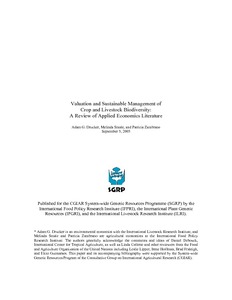Focal point
Location
About IFPRI
The International Food Policy Research Institute (IFPRI) provides research-based policy solutions to sustainably reduce poverty and end hunger and malnutrition in developing countries. Established in 1975, IFPRI currently has more than 500 employees working in over 50 countries. It is a research center of theCGIAR Consortium, a worldwide partnership engaged in agricultural research for development.
Vision and Mission
IFPRI’s vision is a world free of hunger and malnutrition. Its mission is to provide research-based policy solutions that sustainably reduce poverty and end hunger and malnutrition.
What We Do
Research at IFPRI focuses on six strategic areas:
- Ensuring Sustainable Food Production: IFPRI’s research analyzes options for policies, institutions, innovations, and technologies that can advance sustainable food production in a context of resource scarcity, threats to biodiversity, and climate change. READ MORE
- Promoting Healthy Food Systems: IFPRI examines how to improve diet quality and nutrition for the poor, focusing particularly on women and children, and works to create synergies among the three vital components of the food system: agriculture, health, and nutrition. READ MORE
- Improving Markets and Trade: IFPRI’s research focuses on strengthening markets and correcting market failures to enhance the benefits from market participation for small-scale farmers. READ MORE
- Transforming Agriculture: The aim of IFPRI’s research in this area is to improve development strategies to ensure broad-based rural growth and to accelerate the transformation from low-income, rural, agriculture-based economies to high-income, more urbanized, and industrial service-based ones. READ MORE
- Building Resilience: IFPRI’s research explores the causes and impacts of environmental, political, and economic shocks that can affect food security, nutrition, health, and well-being and evaluates interventions designed to enhance resilience at various levels. READ MORE
- Strengthening Institutions and Governance: IFPRI’s research on institutions centers on collective action in management of natural resources and farmer organizations. Its governance-focused research examines the political economy of agricultural policymaking, the degree of state capacity and political will required for achieving economic transformation, and the impacts of different governance arrangements.
Research on gender cuts across all six areas, because understanding the relationships between women and men can illuminate the pathway to sustainable and inclusive economic development.
IFPRI also leads two CGIAR Research Programs (CRPs): Policies, Institutions, and Markets (PIM) andAgriculture for Nutrition and Health (A4NH).
Beyond research, IFPRI’s work includes partnerships, communications, and capacity strengthening. The Institute collaborates with development implementers, public institutions, the private sector, farmers’ organizations, and other partners around the world.
Resources
Displaying 1021 - 1025 of 1521Policy analysis for sustainable land management and food security in Ethiopia
Policy Analysis for Sustainable Land Management and Food Security in Ethiopia presents a bioeconomic model of this less- favored area in the Ethiopian highlands. The main reason for selecting this case study area is the unique availability of both biophysical and socioeconomic data covering a period of 15 to 20 years.The data provides a valuable opportunity to analyze the relationships between population pressure, poverty, and land degradation and to test policies for reducing vulnerability and improving sustainable management of the resource base....
Valuation and sustainable management of crop and livestock biodiversity: a review of applied economics literature
This paper is part of the follow-up to the workshop “Managing Agricultural Biodiversity for Sustainable Development” organized by the International Plant Genetic Resources Institute (IPGRI) for the CGIAR System-wide Genetic Resources Programme (SGRP) and hosted by the World Agroforestry Centre (ICRAF), Nairobi, Kenya (23-25 October, 2003, Nairobi, Kenya).
Reducing poverty and hunger in India
India's strategy for reducing poverty and hunger has always placed a great deal of importance on the agricultural sector, reflecting the fact that 70 percent of the population lives in rural areas and the overwhelming majority of them depend upon agriculture as their primary source of income. The focus of attention has of course changed over time.
Information and communication technologies for the poor
This brief is based on Information and Communication Technologies for Development and Poverty Reduction: The Potential of Telecommunications, ed. Maximo Torero and Joachim von Braun (Johns Hopkins University Press and IFPRI, 2006) "The variety of views about ICTs reveals that their role in development is unclear, especially without convincing evidence of their impact—and little research has been conducted on the direct and indirect links between ICTs and poverty reduction.
Water rights reform: lessons for institutional design
Internationally there is growing understanding that water rights are important and that a lack of effective water rights systems creates major problems for the management of increasingly scarce water supplies. However, discussion of water rights has often failed to recognize the range of available institutional options, the rich diversity of lessons from experience, and the need for appropriate flexibility in adapting institutional design to dynamic local conditions.





